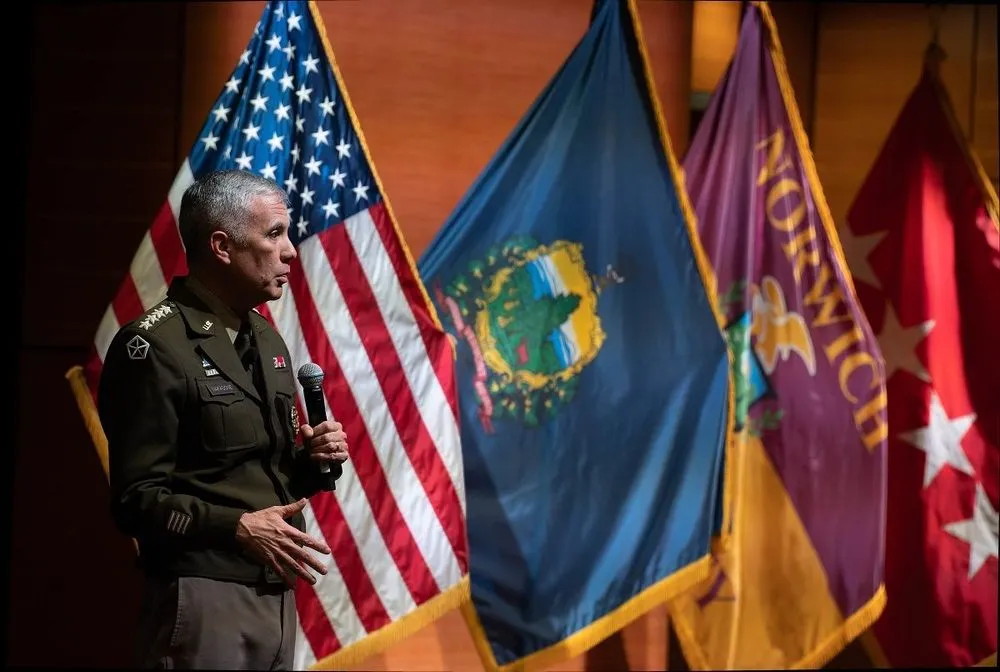Nakasone: 2024 will be most secure election ‘to date’
The outgoing director of the country’s largest intelligence agency and top digital warfighting organization on Tuesday predicted that the 2024 U.S. election would be the safest yet from foreign interference.
“Yes, I believe it will be the most secure election we’ve had to date,” retiring U.S. Cyber Command and NSA chief Army Gen. Paul Nakasone said during a media roundtable at Fort Meade, MD, which is home to both entities.
He added that he hasn’t “seen anything” yet to indicate significant cyberattacks on this year’s election are being planned right now.
Federal and state election officials have braced for potential online attacks every election cycle since 2016, when Russia unleashed digital and disinformation campaigns that the U.S. intelligence community eventually concluded were attempts to tilt the presidential race in favor of Donald Trump.
Over the last three election cycles, Cyber Command and NSA have worked with CISA, the FBI and other agencies to prevent adversaries from tampering with the U.S. voting process — including conducting offensive digital strikes and other measures against foreign adversaries.
Nakasone’s prediction comes a month after the U.S. clandestine community concluded that Russia, China and others attempted to undermine the 2022 midterm elections, but did not succeed in tampering with the country’s voting infrastructure.
It also comes as the four-star general prepares to hand over command of the two organizations he has led for almost six years. Air Force Lt. Gen. Timothy Haugh will take the reins of both entities during a change-of-command ceremony on Friday.
Nakasone took Cyber Command and NSA at a time when the country was still uncovering the full extent of Moscow’s digital onslaught and immediately focused on securing the 2018 midterms.
The defense of the 2016 election was “totally insufficient,” Nakasone told reporters.
The failure contributed, in part, to the doctrine of “persistent engagement,” where American operators constantly interact with adversaries in cyberspace.
It also forced the federal government to share more information and threat indicators among themselves and put Nakasone’s agencies on a more aggressive footing by striking back at adversaries, either through offensive operations or exposing their tactics and techniques, according to Nakasone.
There are now “more players” who could interfere in U.S. elections, he noted, naming Iran and China specifically.
CNN reported, citing anonymous sources, that Chinese leader Xi Jinping vowed to President Joe Biden in November that China wouldn’t interfere in the 2024 election, a promise that was repeated during a recent meeting of top officials.
Nakasone said he was not familiar with the conversations.
“I’m always going to trust but verify,” he added. “So there’s going to be vigilance.”
Nakasone downplayed concerns that the U.S. defense of the election would be hamstrung by recent legal wranglings that have limited the ability for CISA and FBI to communicate with social media companies, including about potential threats.
“If this isn’t going to work … then we’ve got to find new ways to do it,” he told reporters, noting that other organizations, such as the National Guard, have assumed a larger role in election security in recent years.
“I do look at the different challenges with all our partners, and, if it’s going to be different, how do we do that?"
Martin Matishak
is the senior cybersecurity reporter for The Record. Prior to joining Recorded Future News in 2021, he spent more than five years at Politico, where he covered digital and national security developments across Capitol Hill, the Pentagon and the U.S. intelligence community. He previously was a reporter at The Hill, National Journal Group and Inside Washington Publishers.



